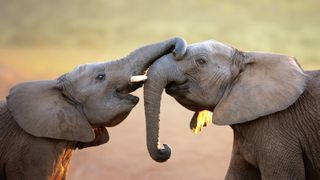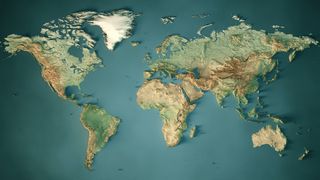
Meg Duff
Meg Duff is a freelance science journalist and audio producer based in Brooklyn. She holds an M.F.A from New York University's Arthur L. Carter Journalism Institute. Her stories have also appeared in Slate Magazine, Scientific American, MIT Technology Review, and elsewhere.
Latest articles by Meg Duff

Drinking wastewater, building an island from scratch and creating an urban forest: 3 bold ways cities are already adapting to climate change
By Meg Duff published
Feature Climate change will fundamentally challenge the world's urban centers. Three cities — San Diego, Milan and Jakarta — offer lessons for how to adapt to a warming planet.

Elephants say 'hello' to friends by flapping their ears and making little rumbly noises
By Meg Duff published
Elephants use ear flaps, rumbles, trunk reaches and other forms of communication to greet peers, new research suggests.

When were sea levels highest?
By Meg Duff published
Sea levels were extraordinarily high during the last period of the dinosaur age. But ocean levels may have been even higher before that.

Why are insects attracted to artificial lights?
By Meg Duff last updated
Artificial lights can be deadly to the insects that fly around them, so why do these critters do it?

Which islands will become uninhabitable due to climate change first?
By Meg Duff published
Climate change is raising sea levels, and many low-lying islands are at risk. But determining which communities will be first to leave is impossible to answer.

Could a star ever become a planet?
By Meg Duff published
Most scientists say a star can never become a planet, but the boundaries between these stellar objects can sometimes be murky.

What are the most polluted cities in the world?
By Meg Duff published
Cities like Lahore, Pakistan, Hotan China and Delhi, India have consistently poor air quality, but it's impossible to accurately identify the city with the world's worst air pollution.

Is pee sterile?
By Meg Duff published
Here's the science behind urine and whether it's sterile or swimming with bacteria.

Can hot drinks help you cool down?
By Meg Duff published
It may sound counterintuitive, but can a steaming drink cool you down on a scorching day?

Do the Pacific Ocean and the Atlantic Ocean mix?
By Meg Duff published
Photos show what looks like a line between the Atlantic and Pacific with different water colors on either side, but is there some kind of barrier or do the two oceans mix?

What is the maximum number of biological parents an organism can have?
By Meg Duff published
Most organisms have two parents, but not all. Could an individual have three parents, or even more?

What is the 'ship of Theseus' thought experiment?
By Meg Duff published
The Greek writer Plutarch proposed this question: If a ship's planks are replaced over time due to wear and tear until none of the original pieces remain, is it still the same ship?

Why do cats purr?
By Meg Duff published
Cats may purr because they're happy, but also for a slew of other reasons, including getting their owner's attention and stress.

Which animals have entered the 'Stone Age'?
By Meg Duff published
Humans aren't the only species that has entered the Stone Age. Who else is in the club?
Get the world’s most fascinating discoveries delivered straight to your inbox.


